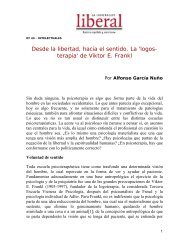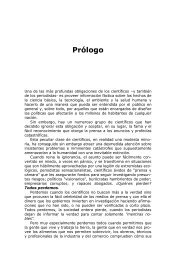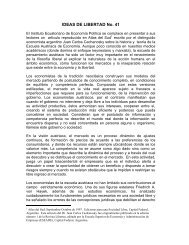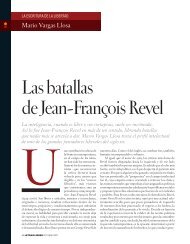Darfur: Blueprint for Genocide - Archipielago Libertad
Darfur: Blueprint for Genocide - Archipielago Libertad
Darfur: Blueprint for Genocide - Archipielago Libertad
You also want an ePaper? Increase the reach of your titles
YUMPU automatically turns print PDFs into web optimized ePapers that Google loves.
Security of African civ ilians in <strong>Darfur</strong> has been an issue<br />
since 2000 (See Appendices E and F). International<br />
attention only turned to the region in September 2003<br />
follow ing six months of armed resistance to the GoS. But it<br />
was only in June 2004 that the security of civilians became<br />
an issue on the international community ’s agenda. As of<br />
November 2004, the practical measures taken to increase<br />
security remain wholly inadequate.<br />
In early 2004, those members of the international<br />
community engagingwith the GoS over <strong>Darfur</strong> employed a<br />
tactic of quiet diplomacy, fearing that any thing more would<br />
jeopardise the impending North/South peace deal.<br />
Although by February the first reports were being<br />
published giving the background to the crisis and ev idence<br />
of the ongoing and w idespread atrocities, 72 the crisis was<br />
cast and managed as humanitarian in nature. 73 A ceasefire<br />
was being pursued by the international community,<br />
primarily with the aim of securing humanitarian access.<br />
The security of civilians remained low on the priority list<br />
shaping policy. Perhaps there was an assumption that a<br />
ceasefire would provide security . That is not necessarily<br />
the case in a genocidal situation.<br />
Following the signing of the ceasefire in Ndjamena on 8<br />
April, its maintenance and the attainment of a political<br />
settlement became the major concern.<br />
Deployment of observers to monitor the ceasefire between<br />
the GoS, SLA and JEM was seen as key. Whilst the<br />
monitoring of the ceasefire was vital, on its own this w as<br />
not a measure that w ould provide security <strong>for</strong> the<br />
threatened population. This was a ty pical response to a<br />
conflict situation. But this was not just a conflict situation.<br />
In IDP camps such as Kailek, a policy of <strong>for</strong>ced starvation<br />
was being implemented against civilians. These measures<br />
would do nothing to help them. Quiet diplomacy and<br />
emphasis on the humanitarian crisis continued despite<br />
reports that in camps such as Kailek, security was so bad<br />
that starv ing IDPs refused humanitarian aid <strong>for</strong> fear it<br />
would single them out <strong>for</strong>Janjaweed attack. 74<br />
Following publication of the United Nations High<br />
Commission <strong>for</strong> Human Rights (UNHCHR) report at the<br />
beginning of May, the language used by the international<br />
community to describe the situation began to change,<br />
indicating that the grav ity of the situation in <strong>Darfur</strong> w as<br />
72 Amnesty International (2004) Too Many People Killed <strong>for</strong> no<br />
Reason, Report no. AFR 54/008/2004.<br />
73 Slim, H. (2004). “ Dithering Over <strong>Darfur</strong>” , International Affairs, Vol<br />
80, No 5, 811-833.<br />
74 UN Inter-Agency Fact Finding and Rapid Assessment Mission<br />
(April 2004), Kailek Town; South <strong>Darfur</strong>.<br />
Section 4: Security<br />
beginning to register with policy makers. 75 How ever, the<br />
lack of attention in the Security Council betrayed a lack of<br />
urgency on the part of the international community, despite<br />
USAID w arnings that 350,000 might die unless decisive<br />
action were taken. 76 Despite increasing reports of<br />
Janjaweed being incorporated into the GoS’s Popular<br />
Defence Force to ‘provide security in <strong>Darfur</strong>’, many EU<br />
countries were calling <strong>for</strong> Sudan to disarm the Janjaweed.<br />
No en<strong>for</strong>cement actions were being taken, nor appeared<br />
likely to be taken in the near future. The international<br />
community was continuing to rely upon the good faith of<br />
the GoS, of which therewas little evidence.<br />
By June, <strong>Darfur</strong> had become a major international concern<br />
and civilian security was beginning to be recognised as a<br />
key issue. The diplomatic pressure exerted by the<br />
international community increased, with a number of highlev<br />
el diplomatic visits to Sudan. Serious consideration was<br />
giv en to taking en<strong>for</strong>cement action to pursuade the GoS to<br />
comply with its ceasefire agreements, with consideration of<br />
sanctions and no-fly zones.<br />
Diplomatic pressure reached a peak at the beginning of<br />
July, with the visits of the UN Secretary General, Kofi<br />
Annan and US Secretary of State Colin Powell. Both<br />
pressed the GoS <strong>for</strong> the disarmament of the Janjaweed.<br />
Annan obtained promises from the GoS that it would<br />
deploy more troops to stop militia violence. However,<br />
knowledge of previous complicity of Sudanese security<br />
<strong>for</strong>ces in attacks and the bad faith demonstrated by the<br />
GoS up till now meant that this promise should not have<br />
raised any hopes. Indeed, further troops in the region was<br />
more acause <strong>for</strong> alarm.<br />
The US continued to <strong>for</strong>ce the issue into July. Following a<br />
month of disagreement ov er the measures that should be<br />
taken against Sudan, a UN resolution was passed. Whilst<br />
welcome, the 30 days’ grace given by UN Resolution 1556<br />
be<strong>for</strong>e sanctions would be imposed was generous to the<br />
GoS, considering it had spent the last three months<br />
violating the agreements it had made in the April ceasefire<br />
agreement, and reports from the new AU monitors<br />
confirmed that atrocities were continuing. Although there<br />
was w ill <strong>for</strong> stronger action among some members of the<br />
Security Council, most notably the United States, strong<br />
UN action was opposed, in particular by China, which has<br />
inv estments in Sudan’s oil industry worth $15 billion. Arab<br />
League opposition w as also significant, especially at a<br />
time when Western actions against Sudan could easily be<br />
75 Statements made by the UN and the US calling the situation in<br />
<strong>Darfur</strong> genocide. Sweden warns that <strong>Darfur</strong> faces possible genocide.<br />
76 UN Wire (2004) “ Sidelining of Factions Could Threaten Sudan<br />
Peace Ex perts Warn” ,<br />
http://www.unwire.org/News/328_426_24350.asp [Accessed 16<br />
November 2004].<br />
24



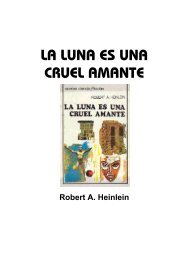
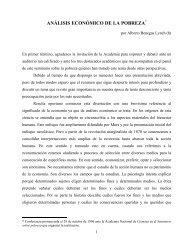
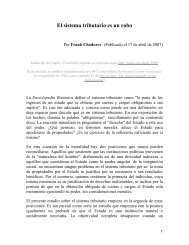
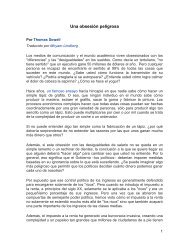
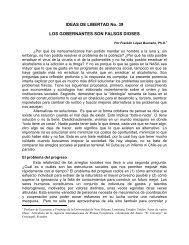
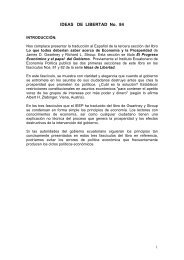
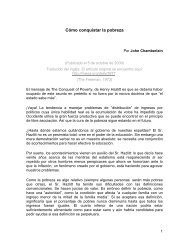
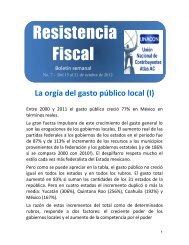
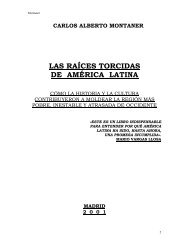
![0091 Stewart - La magia y el misterio del comercio [parte I].pdf](https://img.yumpu.com/16943279/1/169x260/0091-stewart-la-magia-y-el-misterio-del-comercio-parte-ipdf.jpg?quality=85)
